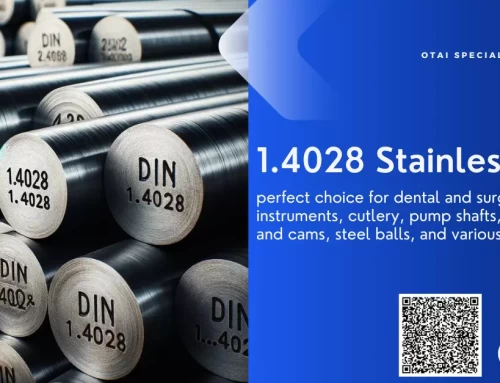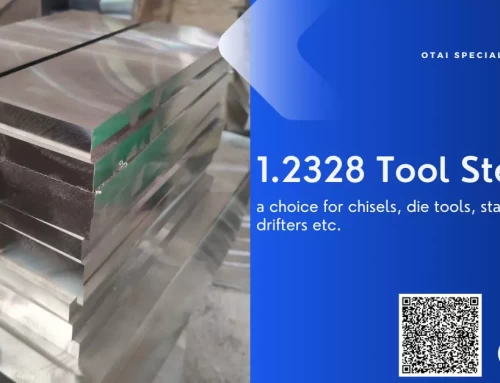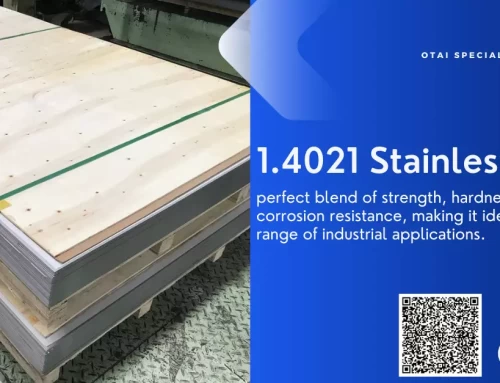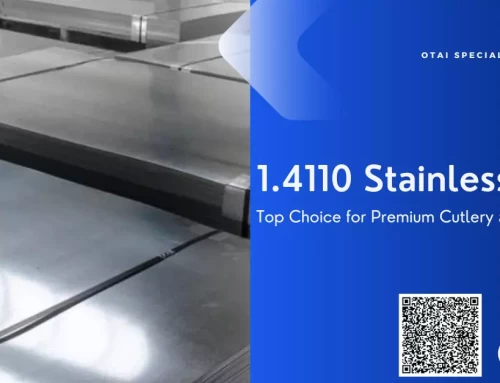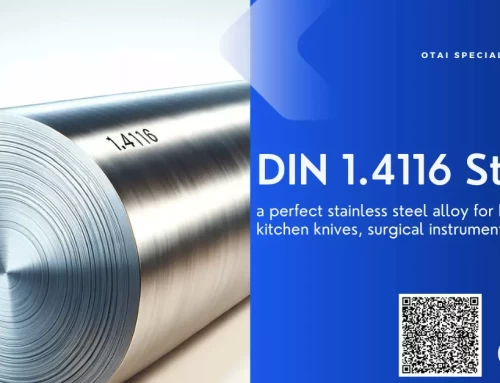1. What is 1.2316 Steel?
DIN 1.2316 material is a chrome-molybdenum tool steel known for its improved corrosion resistance properties. This steel variant boasts excellent polishability, toughness, heat resistance, and wear-resistant properties. It is widely favored for tools designed to process chemically aggressive plastic materials, such as PVC. The steel material 1.2316 is martensitic stainless chromium steel, offering uniform hardness across all dimensions. It’s easy to machine and provides a high surface finish and polishability. 1.2316 is often chosen over steel 1.2083 due to its superior corrosion resistance which makes it ideal for manufacturing chemically aggressive materials like PVC and plastics containing abrasive fillers.
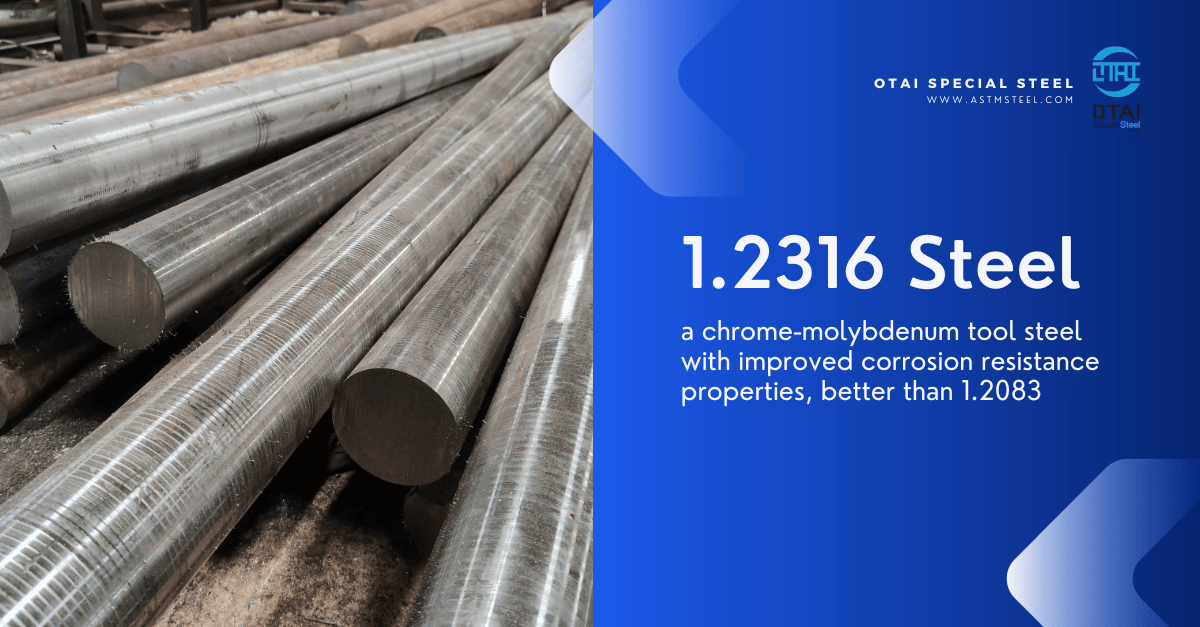
2. Supply Range of Steel 1.2316
- 1.2316 Round Bar: Φ16mm~500mm x random length
- 1.2316 Steel Plate: 12mm~300mm x random length (*Thickness 31~80mm available in stock for fast delivery.)
- Condition: annealed, or Q+T (preharden); black surface & machined surface
3. Relevant 1.2316 Specification and 1.2316 Steel Equivalent
- DIN ISO 4957:2018 : X38CrMo16-1.2316
- DIN 17350:X36CrMo17 – 1.2316
- AFNOR : Z35CD17
- AISI : 422
- EN 10088: X39CrMo17-1 – 1.4122
- JIS : SUS4201J2
4. 1.2316 Chemical Composition and Equivalent’s Chemical cCmposition
|
Standard |
Steel Grade | |||||||
| Chemical composition % | ||||||||
| C: | Mn: | Si: | P: | S: | Cr: | Mo: | Ni: | |
| EN 10088-3:2014 | X39CrMo17-1 – 1.4122 | |||||||
| 0.33 – 0.45 | <1.5 | <1.0 | <0.04 | <0.03 | 15.5 – 17.5 | 0.8 – 1.3 | <1.0 | |
| ISO 4957:2018 | X38CrMo16 – 1.2316 | |||||||
| 0.33 – 0.45 | <1.5 | <1.0 | <0.03 | <0.03 | 15.5 – 17.5 | 0.8 – 1.3 | <1.0 | |
| DIN 17350:1980 | X36CrMo17 – 1.2316 | |||||||
| 0.33 – 0.43 | <1.0 | <1.0 | <0.03 | <0.030 | 15.0 – 17.0 | 1.0 – 1.3 | <1.0 | |
| NF A35-590 | Z38CD16-01 | |||||||
| 0.33 – 0.45 | <1.0 | <1.0 | <0.04 | <0.015 | 15.5 – 17.5 | 0.8 – 1.3 | – | |
| NF | Z35CD17 | |||||||
| 0.33 – 0.45 | <1.5 | <1.0 | <0.03 | <0.03 | 15.5 – 17.5 | 0.8 – 1.3 | <1.0 | |
| PN | 3H17M | |||||||
| 0.33 – 0.43 | <1.0 | <1.0 | <0.045 | <0.030 | 15.5 – 17.5 | 1.0 – 1.3 | <1.0 | |
5. 1.2316 Steel Properties
1.2316 tool steel is known for its uniform hardness, making it easy to machine. It also offers a high surface finish, polishability, and is commonly used for plastic molds. The steel provides a higher corrosion resistance than some other grades, making it suitable for manufacturing chemically aggressive materials.
6. Forging of 1.2316
Information on the forging of 1.2316 stainless steel is not provided in the source. Further research is required.
7. Heat Treatment of 1.2316
It’s supplied in pre hard (Q+T) condition, usually no heat treatment is needed.
- Annealing: 760 to 800 °C for about 4 to 5 hours; slow controlled cooling of 10 to 20 °C per hour to about 650 °C; further cooling in air, max. 230 HB
- Stress Relieving: Soaking is done at temperature 600 – 650°C and then it is furnace cooled. This process is done at approx. 650 °C.
- Hardening: Heat to 1020 – 1040 °C. Quench in oil at 500 – 550°C. Hardness after quenching: 48 – 52 HRC
- Tempering: The hardness varies depending on the tempering temperature, ranging from 32 HRC to 49 HRC.
8. Application of 1.2316 Material
1.2316 steel is primarily used in the production of tools for processing chemically aggressive plastic materials, such as PVC. It is also used in injection molds for plastics, die-casting molds, molding of corrosive materials (PVC), and extrusion tools.
Conclusion
Material 1.2316 is a versatile tool steel with a range of applications, especially in the plastic molding industry. Its unique properties, such as improved corrosion resistance and uniform hardness. That makes it a preferred choice for many manufacturers. If you have any questions or need further information about 1.2316 tool steel or any other steel grades, please don’t hesitate to contact us at jeremy@otaisteel.com or WhatsApp +8613610149979.
FAQs
- What is the primary use of 1.2316 material?
1.2316 steel is mainly used for tools designed to process chemically aggressive plastic materials, such as PVC. - How does 1.2316 material compare to 1.2083?
1.2316 offers superior corrosion resistance compared to 1.2083. - Is 1.2316 easy to machine?
Yes, 1.2316 steel offers uniform hardness across all dimensions, making it easy to machine. - What is the hardness of 1.2316 material after annealing?
The hardness after annealing is a maximum of 235 HB per standard. - Can I get DIN 1.2316 in specific sizes?
Yes, 1.2316 material is available in various sizes, both in round bars and steel plates. We can also provide machined pieces with tolerance and roughness for you.

